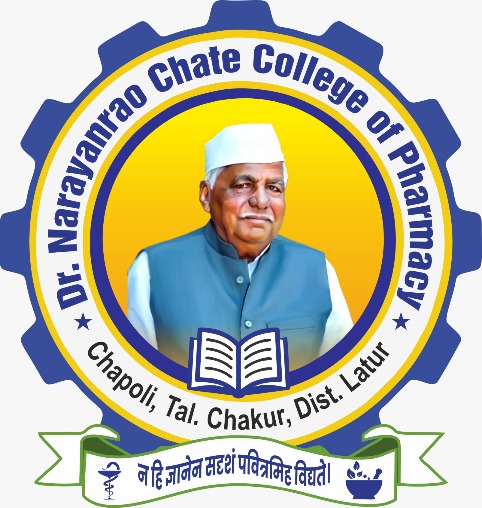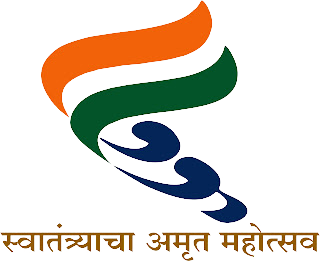Diploma in Pharmacy ( D. Pharmacy)
|
Level |
Diploma in Pharmacy |
|
Intake
|
60 Seats |
|
DTE Code |
2645 |
|
MSBTE Code |
52350 |
|
Assessment Pattern |
Annual Pattern |
|
Study Mode |
Full Time (02 Years) |
|
Examinning Authority |
Maharashtra State Board Technical Education, Mumbai |
Overview
The Dr. Narayanrao Chate College of Pharmacy in the Year 2023 under the management of Navayuvak Shikshan Prasarak Mandal, Chapoli with permission from the Pharmacy Council of India (PCI), New Delhi and Directorate of Technical Education (DTE), Government of Maharashtra, Mumbai started the Integrated Diploma in Pharmacy (D. Pharm.) course affiliated with Maharashtra State Board Technical Education, Mumbai.
D Pharmacy course is a diploma-level program is a professional program that prepers students for career as Pharmacist that provides comprehensive training in pharmaceutical science and practice. The course curriculum typically takes Two Years and it covers subjects such as Pharmaceutics, Pharmaceutical Chemistry, Pharmacology, Pharmacognosy, and Hospital Pharmacy. Students also learn about drug formulations, dosage forms, drug delivery systems, pharmacokinetics, and pharmacotherapy Pharmacy Law and Ethics, patient care and Public health. The program includes theoretical classes, laboratory sessions for practical learning, and hands-on training in pharmacy settings.
- Pharm pass out students have a wide range of scope and career opportunity including retail pharmacist, Medical representative Government pharmacist, industry, Academic etc. They can also pursue higher education that B. Pharmacy, Pharm. D.
- Pharm. Course provide the knowledge of healthcare and biochemical science to the students. Students interested in pharmacy-related positions in healthcare and drug industry can pursue this course. To be eligible for admission into a D. Pharm. program, candidates must have completed the 10+2 Science Stream and meet the program-specific requirements.
Objectives of D. Pharmacy Program :-
- To inspire the students to pursue higher education and to appear for competitive exams and other value added programs for their holistic development.
- To integrate pharmacy knowledge and skills with a fringe of self-motivation so as to increase inclination for higher studies and research.
- To develop pharmacists to contribute effectively in the social health care system.
- To provide hands on training through state of art infrastructure to meet challenges of pharmacy profession.
- To inculcate leadership and entrepreneurship capabilities in future pharmacists
- Students will be able to become a lifelong learner to absorb newer technologies and plays pivotal role in the society.
- Students will be effective communicators, with other healthcare professionals for dispensing medicines with professional ethics and social responsibilities.
Program Outcomes Of D. Pharmacy
Professional Identity : Understand, analyze and communicate the value of their professional roles in society (e.g. health care professionals, suppliers of pharmaceuticals, promoters of health, educators, business managers, employers, employees) through consideration of historical, social, economic and political issues.
The Pharmacist and Society :- Apply reasoning informed by the contextual knowledge to assess societal, health, safety, legal and cultural issues and the consequent responsibilities relevant to the professional pharmacy practice.
Leadership Skills : Understand and consider the human reaction to change, motivation issues, leadership and team-building when planning changes required for fulfillment of practice, professional and societal responsibilities. Assume participatory roles as responsible citizens or leadership roles when appropriate to facilitate improvement in health and well-being.
Problem analysis: Utilize the principles of scientific enquiry, thinking analytically, clearly and critically, while solving problems and making decisions during daily practice. Find, analyze, evaluate and apply information systematically and shall make defensible decisions.
Pharmaceutical Ethics: Apply ethical principles in professional and social contexts. Demonstrate behavior that recognizes cultural and personal variability in values, communication and lifestyles. Use ethical frameworks; apply ethical principles while making decisions and take responsibility for the outcomes associated with the decisions and honour personal values.
Communication: Communicate effectively with the other Health care preoffessional and pharmacy community and with society at large, such as, being able to comprehend and write effective reports, make effective presentations and documentation, and give and receive clear instructions.
Life-long learning: Recognize the need for, and have the preparation and ability to engage in independent and life-long learning in the broadest context of technological change. Self- assess and use feedback effectively from others to identify learning needs and to satisfy these needs on an ongoing basis.
Environment and Sustainability: Understand the impact of the professional pharmacy solutions in societal and environmental contexts, and demonstrate the knowledge of, and need for sustainable development

